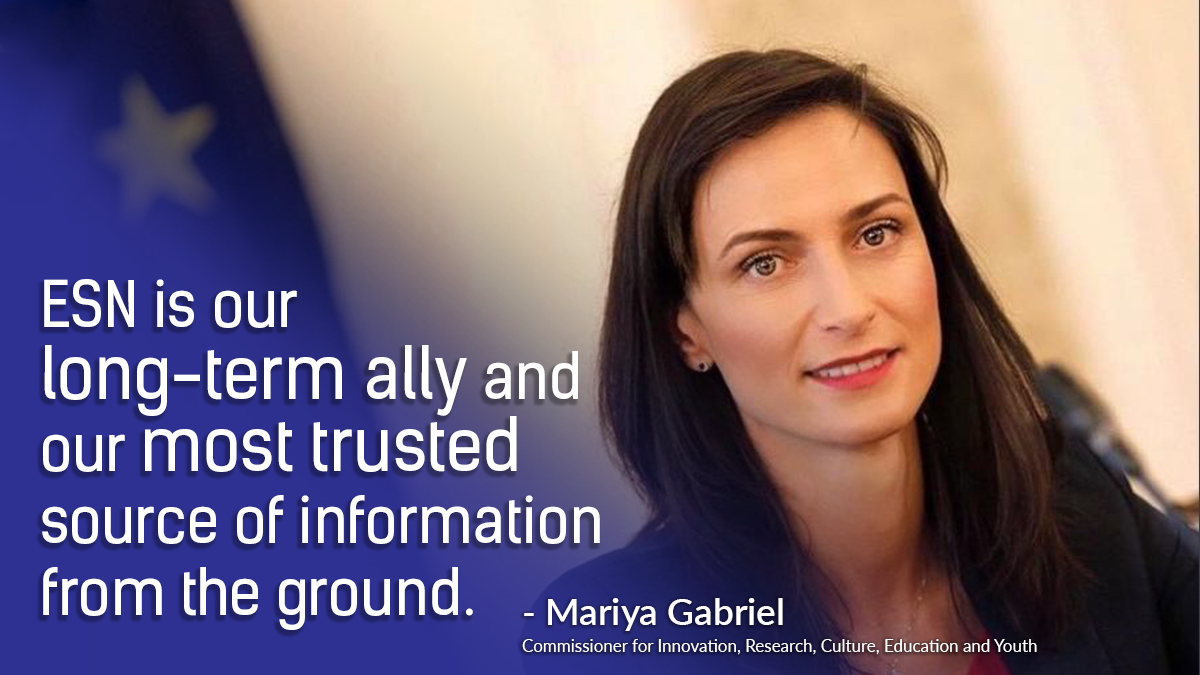
Dear Students,
Although I cannot be there with you today, I couldn’t miss this chance to send a word of appreciation for your work and wish you a very enriching meeting.
This year we are celebrating the 35th anniversary of Erasmus+, and at the same time, the European Year of Youth. For more than 30 years, ESN volunteers have been instrumental to making the Erasmus+ programme a true success. You have been determined to make it more than just an international exchange programme, but a life-changing experience for many.
You, Erasmus+ students, know better than anyone the benefits of the programme. Erasmus+ boosts the personal, social and professional development of students. It enhances knowledge, skills and attitudes, improves employability, helps confidence-building and independence, stimulates curiosity and innovation. As Erasmus+ students, you are more in tune with the European values and more inclined to take part in civic engagement. You are part of the Erasmus generation and you are here to pass on everything you learned to the generations after you.
I want to highlight a few ways in which you can do that. This year we are working on updating the “Youth on the Move” Council recommendation and creating a new mobility framework which will boost mobilities. We will also make sure that this framework will be greener, more inclusive and more geographically balanced. ESN is our long-term ally and our most trusted source of information from the ground, so we are very happy to cooperate with you on this.
As announced in the European Strategy for Universities presented in January this year, we are also putting a focus on Erasmus+ traineeships, with more than 100,000 of them offered to students every year, as a great stepping stone towards high-quality employment. It is also a way to address the unbalances in mobility flows across Europe. We want to promote these fantastic opportunities more widely and we want to do it together with ESN. The Erasmusintern.org platform has been instrumental in matching trainees with their work opportunities and we will be looking at ways to develop it further as part of this initiative.
As you know, with a budget that has nearly doubled compared to the previous programming period, Erasmus+ 2021-2027 has the ambition to be not only more inclusive and innovative, but also more digital and greener.
For this to happen, we need your support: we want to reach out to students and staff of different ages, and from diverse cultural, social and economic backgrounds to make sure that the students and staff participating in Erasmus+ reflect the diversity of the populations in Europe. We invite you to reach every corner of your higher education institutions and spread the word about the new mobility opportunities and the additional financial support offered by Erasmus+ to those who otherwise would not consider going abroad. They are not alone and they should not be left behind.
From now on, students who, for various reasons, cannot go abroad for long periods can benefit from more flexible mobility formats, such as blended mobility, which combines a shorter physical stay abroad with online virtual activities. Students and staff can also benefit from innovative learning and training experience through the new blended intensive programmes.
In addition, students and staff have more opportunities to study, teach or train in third countries not associated to the Erasmus+ programme, by acquiring relevant skills and international experience to help address global challenges.
Finally, Erasmus+ procedures have been simplified and digitalised in line with the Commission’s green priorities. To this end, we are rolling out the European Student Card initiative to make administrative processes for mobile students as easy as possible and to facilitate access to online and offline services when students move abroad. The Erasmus+ App is being continuously developed to include information on accessibility and different Erasmus+ destinations.
In light of this, I would like to thank ESN for having launched the “tips campaign” to spread the use of the Erasmus+ App and for promoting it relentlessly.
I cannot conclude this address without sparing a thought for the millions of people impacted by the tragic events in Ukraine, among them your fellow students and colleagues. I know that many of you have been launching fundraising initiatives to send aid to Ukraine or have been offering hosting possibilities to the Ukrainian students fleeing the war. I would like to say thank you for showing solidarity in these terrible moments.
The Commission is also working hard to introduce flexibility into the Erasmus+ programme so that its funding facilitates the integration of Ukrainian learners and staff in Europe. We are going to simplify the procedures for incoming Erasmus+ students and staff from Ukraine, enabling them to continue their studies, teach or conduct a research in a safe environment.
We have also provided training to the credentials evaluators from across the EU to speed up the recognition of academic qualifications of persons fleeing Ukraine. We are encouraging the on-going Erasmus+ cooperation projects to redirect part of their efforts and activities to accommodate refugees in their communities. We are looking forward to hearing more ideas from students and I am sure this conference will be a great opportunity for pooling them.
Congratulations again for organising such a great event and mobilising so much creative energy in one place! I really encourage all of you to participate in the inspiring activities of this edition, including the career fair and the award of the Erasmus Destination of the Year on the last evening.
I hope to see you in person next year!
Mariya Gabriel
Commissioner for Innovation, Research, Culture, Education and Youth


Follow ESN